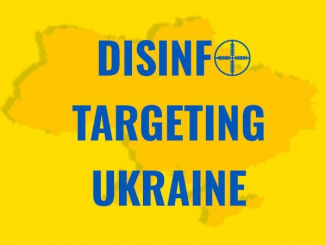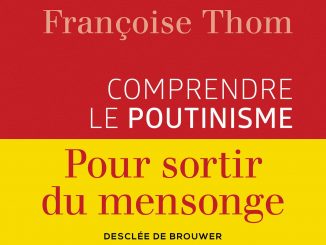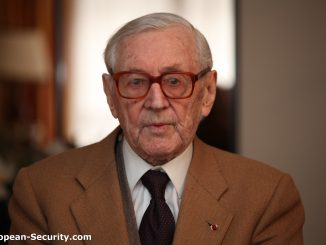French Kremlinophilia on the right and on the left is based on a complex but extremely solid substratum, which we can see today. The French Putinologists seem to be as impervious to reality as their idol, whose obsessions they espouse and for whom they find every excuse. They swallow and regurgitate the most enormous lies of the Kremlin’s propaganda, they are ready to believe that Russia is threatened by NATO, that Ukraine is attacking Russia, that “Crimea has always been Russian”, that “Putin is demonized”, that “Russia is an indispensable partner”. It is a belief that resembles the one that cements a sect around its guru.
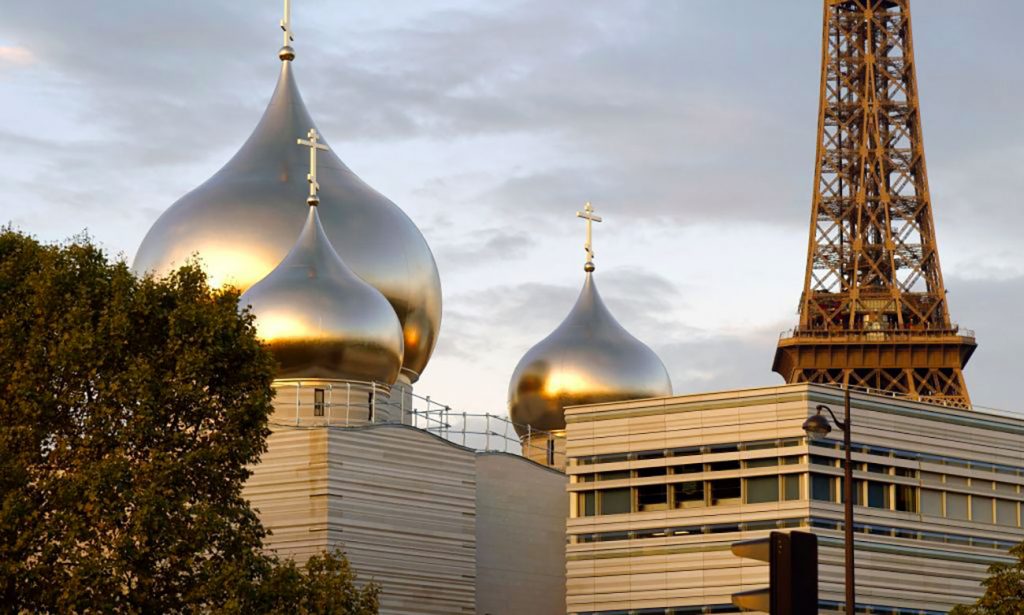
by Françoise Thom — DeskRussia — 26 February 2022 —
At the bottom of the Moscow friendly attitude one finds a sentimental Russophilia dating back to the Franco-Russian alliance, carrying various clichés about Russian spirituality, the allegedly mysterious Russian soul, Dostoyevsky (misunderstood), Tolstoy (who has read him?), the Ballets Russes etc. French admirers of Russia have internalized Slavophile platitudes, especially the one according to which the Russian, because of his mystical soul, is exempt from the rules of common morality. The next layer of our sediment is anti-Americanism, a widespread sentiment in France, which can be explained by the impact of post-war Communist propaganda, itself amplified by the memory of the humiliation of the 1940 defeat and the uncomfortable position of the French in London during the war. The Vichy propaganda against the “Anglo-Saxons” left its mark, especially since it was immediately taken up by communist propaganda. Behind this anti-American theme there is also the fear of modernity and globalization, a phenomenon attributed to the United States, although it predated the very existence of the United States. Moreover, France feels a structural proximity with Russia. Economically and politically, it is a statist country, with Jacobin centralizing tendencies and a strong anti-liberal tropism, common to right-wing and left-wing parties.
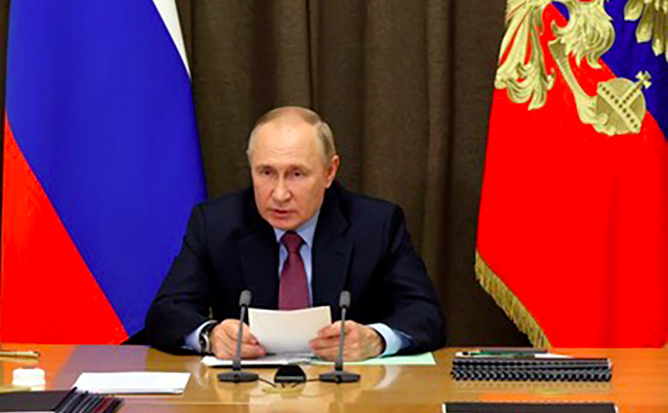
As for the seduction that Putin’s regime exerts today, several causes converge. We will leave aside a very important element, the Russian money that irrigates our decision-makers, our media, our think tanks; let us just recall that Putin boasted to a European foreign minister that Russia could buy anyone in the United States and in Europe. We will also leave aside the French vanity that the Kremlin leaders have been exploiting with unchanged success since December 18, 1917, when Trotsky, then People’s Commissar for Foreign Affairs, spoke of his Francophilia to the French ambassador Joseph Noulens during their first meeting: he displayed “his attachment to France, declaring that he put our people above all others.”1 We will concentrate on the political and psychological factors behind Kremlinotropism.
First, let’s mention a questioning of democracy and the elites. Disgust with French politics leads many French people to look abroad for counter-models. The current climate is very reminiscent of the 1930s, when the rejection of parliamentarianism led some to be enthusiastic about Stalin, others about Mussolini or Hitler. Some French people felt that they were so badly governed at home that they imagined they would be better off under a foreign rule. Today in France, there is the same nostalgia for a “strong man” as during those dismal years. The Russian propaganda that permeates our social networks cultivates relentlessly this rejection of the elites, the so-called “mainstream” media, the democratic institutions, by promoting an apocalyptic perception of the situation in France that would call for a providential man, of course aligned with Moscow. How many times do we hear, in the transport, in the markets: “France is doomed”? So we dream of a charismatic leader who will save the country. Hence Jean-Marie Le Pen’s admiration for Putin: “I think that President Putin is a chance for world peace, it is a chance that there is a balanced, competent, experienced and patriotic man who is at the head of this country”2. “If only we had [in France] a statesman [like Putin] who is able to look at the big picture”, dreams aloud the deputy Claude Goasguen3. This state of mind is particularly after the Russian intervention in Syria. Caroline Galactéros, currently Zemmour’s diplomatic adviser, in an article in Le Figaro, indulges in a vibrant praise of men of power such as Putin, Milosevic or Saddam Hussein, who “consider the centrality of decision-making and authority over their ‘people’ indispensable, whom they […] intend to guide towards a horizon of power and influence that may be questionable, but is at least defined and clear. For them, the collective is more than the sum of particular interests; it must embody something greater than itself.”4
Another category falling under the Kremlin’s spell: our so-called “realists”, such as Hubert Védrine, who dreams undeterred of the “reverse alliance” against the United States: “American hegemonism: another reason, in 1985, to find, in Eastern Europe, a counterweight, a strong and balancing partner”5. Hubert Védrine accuses the American “Deep State” of “having wanted to keep Russia as an enemy after the Cold War“, which, by the way, is not at all the case, we would not be where we are today if the United States had paid serious attention to Russia during the 2000s. But above all, the fascination with force is at the root of the Kremlinotropism of our politicians claiming to be “realists”. Robert Musil rightly noted: “…The man who poses as a realist politician holds only the vileness of man to be real, the only value that seem certain to him; he does not act out of conviction and relies only on coercion and cunning.” The “realists”, like the Kremlin leaders, are convinced that a cynical policy will necessarily be more effective than a policy oriented toward the search for justice and good. This philosophy can lead to disastrous consequences. Georges Bernanos observed in August 1940 that the invocation of “realism”, this “toxin that the spirit of dictatorship secretes, for others”6, serves to justify collaboration after the defeat of 1940.
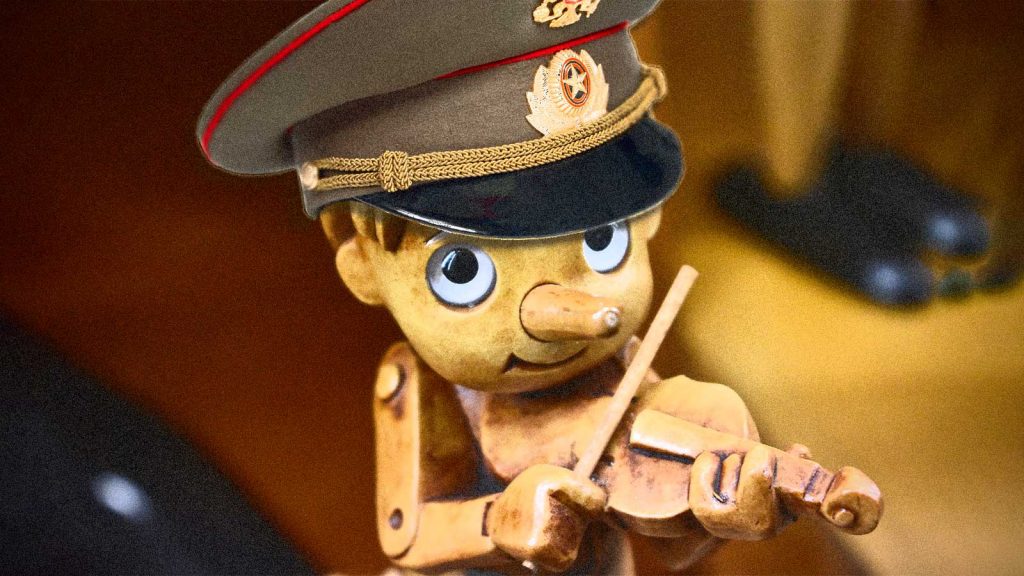
Under the guise of going to war against “political correctness”, against the so-called “pensée unique”, the Kremlin’s propaganda favors the emergence of a conformism of anti-conformism, of a “pensée unique” in mirror where it is a must to stigmatize globalization, American hegemony, Brussels bureaucracy, the decadence of morals, Islamization etc. It is an all-out propaganda: to the right it presents Russia as the champion of “traditional values”, of the “sovereignty” of States, of “European civilization”, of the “protection of the Christians of the East”, to the left it recycles without complex the anti-European Third World ideology which it uses in Mali to discredit France. This Manichean conspiracy vision exported from Moscow, amplified by social networks, is almost irresistible in our era of assumed inculture and intellectual laziness, when reason gives way to the most primitive passions, fear and hatred: there are the bad guys on the one hand, Americans, globalists, multinationals, who pull the strings behind the scenes, and the valiant resistance fighters behind Putin, pitted against America like Asterix against the Roman Empire. This comic book universe has many followers in France.
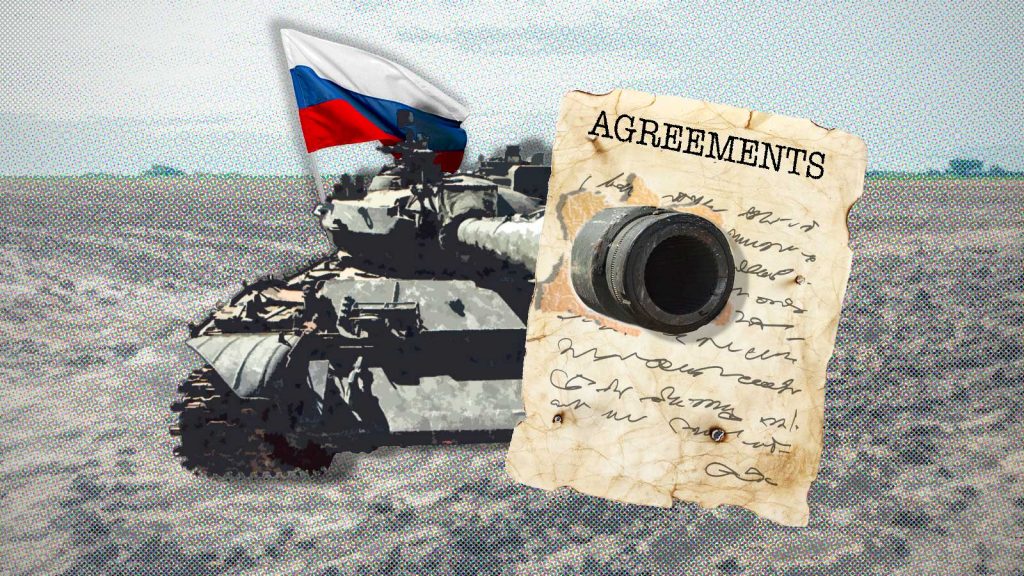
The Kremlin’s propaganda succeeds in an astonishing way in making the French and Russians share the same hatreds and phobias. Thus the hatred of Ukraine has surprisingly been cloned from the Russian media to the French right. It was enough for the Russian propaganda to make people believe that the Maïdan was an American project for a good part of the French right to become ukrainophobic. One can distinguish a “well bred” ukrainophobia, frequent in the pages of Le Figaro: “Without Ukraine, Russia ceases to be an Empire. It ceases to be a threat to the hegemony of the United States.” (Hadrien Desuin). “The pro-Western bias has durably cut Ukraine off from its eastern environment while not yet being integrated into its western neighbourhood. In the middle of the river, the Maïdan party ended up isolated. Two years after the departure of Victor Yanukovych, it is a real Berezina. The Ukrainian state is slowly but surely sinking. The loans guaranteed by the IMF and the EU are diverted. The Ukrainian bankruptcy is almost inevitable…” And, inevitably, we are reminded that “In the wake of American hawks, many European countries have become enthusiastic about the new Ukrainian revolution” (Eléonore de Vulpillières). A theme also intoned by Nicolas Sarkozy who is not ashamed to take up the Kremlin’s line word for word. According to him, the United States are the only ones responsible for the Ukrainian conflict: “The separation between Europe and Russia is a tragedy. That the Americans want it is their right and their problem […], but we do not want the resurgence of a cold war between Europe and Russia”. General Jean Bernard Pinatel justifies the annexation of Crimea in terms that we keep hearing in the mouth of the Russian president: “Putin is only responding with a coup de force to another coup de force that occurred in Ukraine with the complicity of the Europeans and the support of the United States… How could Putin not react to this provocation which was not the first.” Then we have the hysterical ukrainophobia carried by social networks, the one expressed by Eric Zemmour with accents à la Céline: “The chimera of a ruined unified Ukraine but carried at arm’s length by Europe has lived. Its corpse is still moving but not for long” (24/02/2015). On the other hand, Zemmour feels close to the pro-Russian inhabitants of Donbass: “They have no desire to associate with a Western Europe that they see as a decadent land undermined by multiculturalism, insolent irreligion and militant homosexuality.” The examples quoted above mostly date back to the time of the Russian intervention in Syria. But we must not ki ourselves that kremlinophilia has greatly decreased in France under the effect of Putin’s escalation. On January 21, 2022 socialist Ségolène Royal posts on Twitter: “We need a new General de Gaulle who made himself respected by our American friends by telling them to withdraw their troops. Isn’t Russia entitled to the respect of security agreements at its borders? Economic sanctions penalize more Europe “.
And now we are lead to the last sediment of our substratum, the most hidden but perhaps the most active, the “gopnik culture”, as Cécile Vaissié calls it7, the brutal thug mentality which makes much of the attraction for Putin’s Russia, which seduces in the West and especially in France, those who are tired of civilization and its boundaries. Under the discourse of the defense of “traditional values” hides the deep anomie of the Russian regime, whose only conviction is that one can do anything if one is in a position of power: lie, kill, insult, humiliate, rob. The Russian leaders ignore the prohibitions of human civilization and this attracts to Russia many Westerners who resent the constraints of a too-polished society.
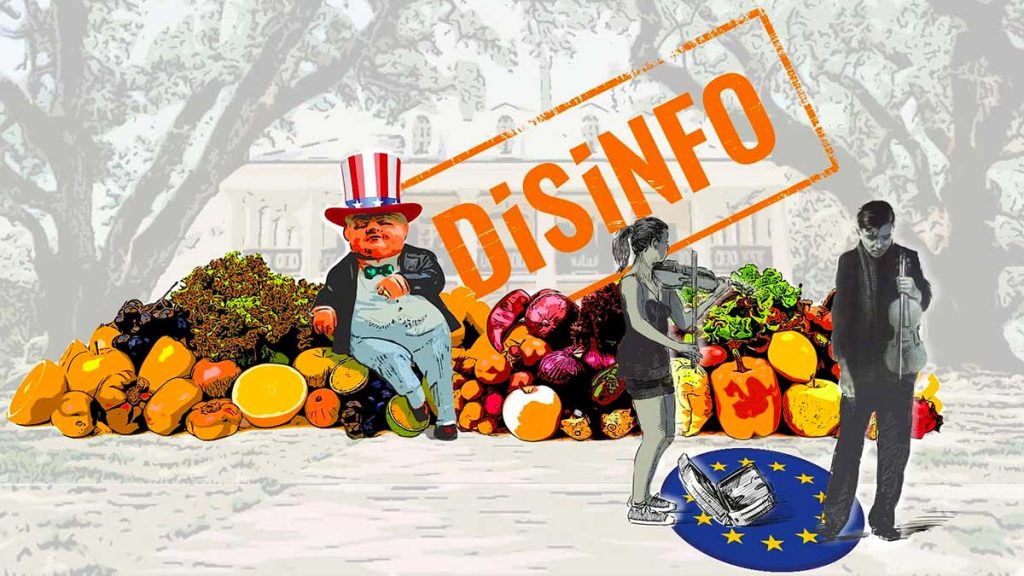
The question of kremlinophilia, widespread in political circles and now in social networks, is by no means academic. If we find ourselves in the current situation, when Putin and his media do not hesitate to explicitly threaten NATO countries with pre-emptive nuclear strikes, it is because for years we did not pay attention to the dangerous drift of the Russian regime, or because our Western “Putinversteher” came up with a thousand excuses for Moscow’s increasingly unacceptable behavior, and hurriedly passed the sponge over the Kremlin’s outrages in the name of “business as usual”. A firm response should have been made in 2008, after the amputation of the Georgian state. Instead, the United States launched the “reset” and France threw itself into cooperation with Russia in the field of armaments, going so far as to sell it helicopter carriers: can one imagine that after Munich France had agreed to modernize the Wehrmacht! The Frankenstein armed to the teeth that has been rising up against us in the East in recent months was born of our laxity and has been strengthened by our complacency. But the lesson has still not been learned in France. It hardly seems believable that today, as in 2017, of the four main candidates in the presidential election, three align themselves with Russian positions.
This pro-Russian tropism against all odds is one of the symptoms of the ills from which the French political class suffers: a frightening contempt for expertise, blindness due to partisan spirit, forgetfulness of the public good, cowardice, and above all a total indifference to ethics and truth — in short, everything that Kremlinophilia feeds on.
- Joseph Noulens, Mon ambassade en Russie soviétique, Plon 1933, t.1, p. 174 ↩
- Interview sur Canal+. Émission du 02 Novembre 2015 : Front National : L’Œil de Moscou ↩
- Figaro, 18/09/2015 ↩
- Caroline Galactéros, Poutine, Orban, Assad Le chef, une espèce en voie de disparition, Figaro, 28/10/2015 ↩
- H. Védrine, Les mondes de François Mitterrand, Fayard, 1996, p. 374 ↩
- Georges Bernanos, Le Chemin de la Croix-des-âmes, in : Scandale de la vérité, Editions Robert Laffont, 2019, p. 563. ↩
- Cécile Vaissié, Les réseaux du Kremlin en France, Ed. Les petits matins, 2016. ↩
See also :
- « La kremlinophilie française : un mal incurable ? » by Françoise Thom in DeskRussie (26.02.2022)
- « Appeler un chat un chat : l’essence criminelle du régime russe » – Mykola Riabtchoul in DeskRussie (25.02.2022)
Françoise Thom’s publications on DeskRussia (2022)
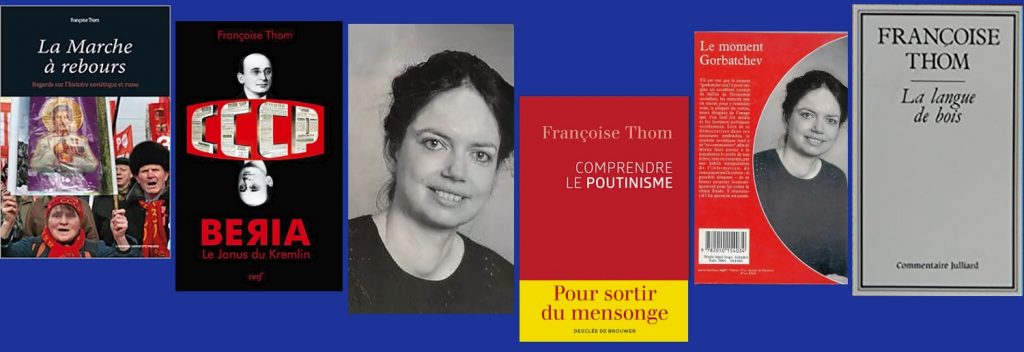
Pourquoi le système poutinien porte la guerre comme la nuée porte l’orage in DeskRussie (2022-06-17)
Why the Putin System Carries war Like a Cloud Carries a Storm in DeskRussia (2022-06-17)
La rhétorique de l’agresseur in DeskRussie (2022-06-03)
The Rhetoric of the Aggressor in DeskRussia (2022-06-03)
L’autre offensive russe in DeskRussie (2022-05-20)
The Other Russian Offensive in DeskRussia (2022-05-20)
L’orthodoxie spéciale du pape François in DeskRussie (2022-05-20)
The special orthodoxy of Pope Francis in DeskRussia (2022-05-20)
L’ivresse de la transgression in DeskRussie (2022-05-06)
Reveling in Transgression in DeskRussia (2022-05-06)
Réflexions mélancoliques sur l’élection française in DeskRussie (2022-04-22)
Melancholic reflections on the French elections in DeskRussia (2022-04-20)
Les idéologues russes visent à liquider la nation ukrainienne in DeskRussie (2022-04-06)
Russian Ideologues Aim to Liquidate the Ukrainian Nation in DeskRussia (2022-04-08)
Pourparlers d’Istanbul : que veut la Russie ? in DeskRussie (2022-04-01)
Istanbul Talks: What Does Russia Want? in DeskRussia (2022-04-02)
Les leçons d’une fin de règne : Staline 1952-3, Poutine 2022 in DeskRussie (2022-03-25)
The lessons of an end of reign: Stalin 1952-3, Putin 2022 in DeskRussia (2022-03-25)
Poutine, ou l’histoire alternative contre l’histoire tout court in DeskRussie (2022-03-18)
Alternative History Against History: the Case of Vladimir Putin in DeskRussia (2022-03-18)
Le monde de l’après-guerre vu de Russie in DeskRussie (2022-03-11)
The Post-war World Seen from Russia in DeskRussia (2022-03-12)
Poutine ou la passion de la malfaisance in DeskRussie (2022-03-04)
Putin or the Passion for Evil in DeskRussia (2022-03-02)
La kremlinophilie française : un mal incurable ? in DeskRussie (2022-02-25)
French Kremlinophilia: an Incurable Disease? in DeskRussia (2022-02-26)
Le dressage de l’Europe : comment le Kremlin exploite la crise ukrainienne in DeskRussie (2022-02-11)
How to Train Europe: the Kremlin’s Exploitation of the Ukrainian Crisis in DeskRussia (2022-02-11)
Poutine : le flirt avec l’apocalypse in DeskRussie (2022-01-28)
Putin: Flirting With Armageddon in DeskRussia (2022-01-28)











